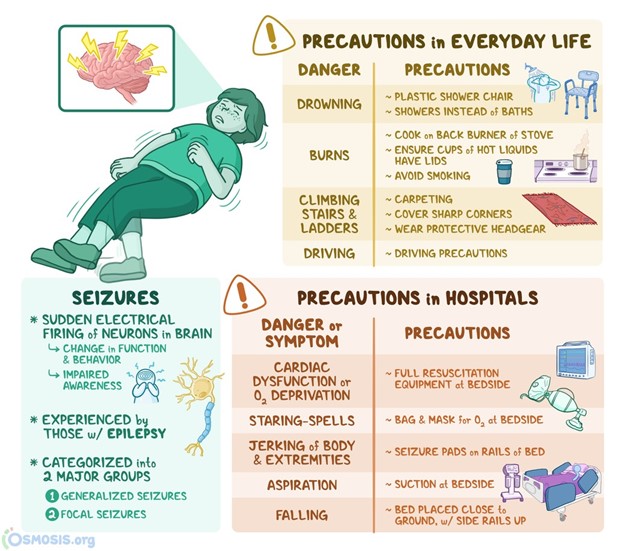A nurse is caring for an adolescent who has hyperthermia.
Which of the following actions should the nurse take?
Cover the adolescent with a thermal blanket
Submerge the adolescent’s feet in ice water
Initiate seizure precautions
Administer oral acetaminophen
The Correct Answer is C

Hyperthermia is a condition in which the body temperature is abnormally high, usually due to exposure to heat, infection, or certain medications.
Hyperthermia can cause neurological complications, such as seizures, confusion, or coma. Therefore, the nurse should initiate seizure precautions for an adolescent who has hyperthermia to prevent injury and protect the airway.
Choice A is wrong because covering the adolescent with a thermal blanket would increase the body temperature and worsen hyperthermia. The nurse should remove excess clothing and use cooling measures, such as fans, ice packs, or cool fluids.
Choice B is wrong because submerging the adolescent’s feet in ice water would cause vasoconstriction and shivering, which would reduce heat loss and increase heat production. The nurse should avoid using extreme cold or ice water to cool the body.
Choice D is wrong because administering oral acetaminophen would not be effective for hyperthermia caused by non-infectious factors, such as heat exposure or medications.
Acetaminophen lowers the body temperature by reducing the hypothalamic set point, which is not altered in hyperthermia. Additionally, oral medications may be difficult to swallow or absorb in a hyperthermic patient.
Normal body temperature ranges from 36.5°C to 37.5°C (97.7°F to 99.5°F). Hyperthermia is defined as a body temperature above 38.5°C (101.3°F).
Nursing Test Bank
Naxlex Comprehensive Predictor Exams
Related Questions
Correct Answer is C
Explanation
The correct answer is Choice C.
Choice A rationale: While additional staff may be needed, the primary focus during a mass casualty event is triage and immediate care. Choice B rationale: Media relations are important, but the nurse's priority is direct patient care. Choice C rationale: Assessing incoming clients and determining their medical needs is crucial for prioritizing care and allocating resources effectively. Choice D rationale: Discharging stable clients may be necessary in extreme circumstances, but it is not the immediate priority. The focus should be on providing care to the influx of injured patients.
Correct Answer is A
Explanation
The correct answer is choice A. Implement firm but flexible boundaries in their relationship.
This is because boundaries can help the client and family to respect each other’s roles, needs and preferences, and to avoid role confusion, resentment or guilt. Boundaries can also promote independence and self-care for the client, as well as prevent caregiver burnout for the family.
Choice B is wrong because minimizing open discussion regarding the changes can lead to misunderstanding, frustration or isolation. The client and family should communicate openly and honestly about their feelings, expectations and challenges, and seek support when needed.
Choice C is wrong because authoritative communication from the adult child can create a power imbalance, undermine the client’s autonomy and dignity, or cause conflict or resistance. The client and family should use respectful and collaborative communication, and involve the client in decision-making as much as possible.
Choice D is wrong because decreasing socialization with extended relatives can reduce the client and family’s support network, increase their stress or loneliness, or limit their opportunities for meaningful activities. The client and family should maintain contact with their relatives and friends, and participate in social or recreational activities that they enjoy.
Whether you are a student looking to ace your exams or a practicing nurse seeking to enhance your expertise , our nursing education contents will empower you with the confidence and competence to make a difference in the lives of patients and become a respected leader in the healthcare field.
Visit Naxlex, invest in your future and unlock endless possibilities with our unparalleled nursing education contents today
Report Wrong Answer on the Current Question
Do you disagree with the answer? If yes, what is your expected answer? Explain.
Kindly be descriptive with the issue you are facing.
